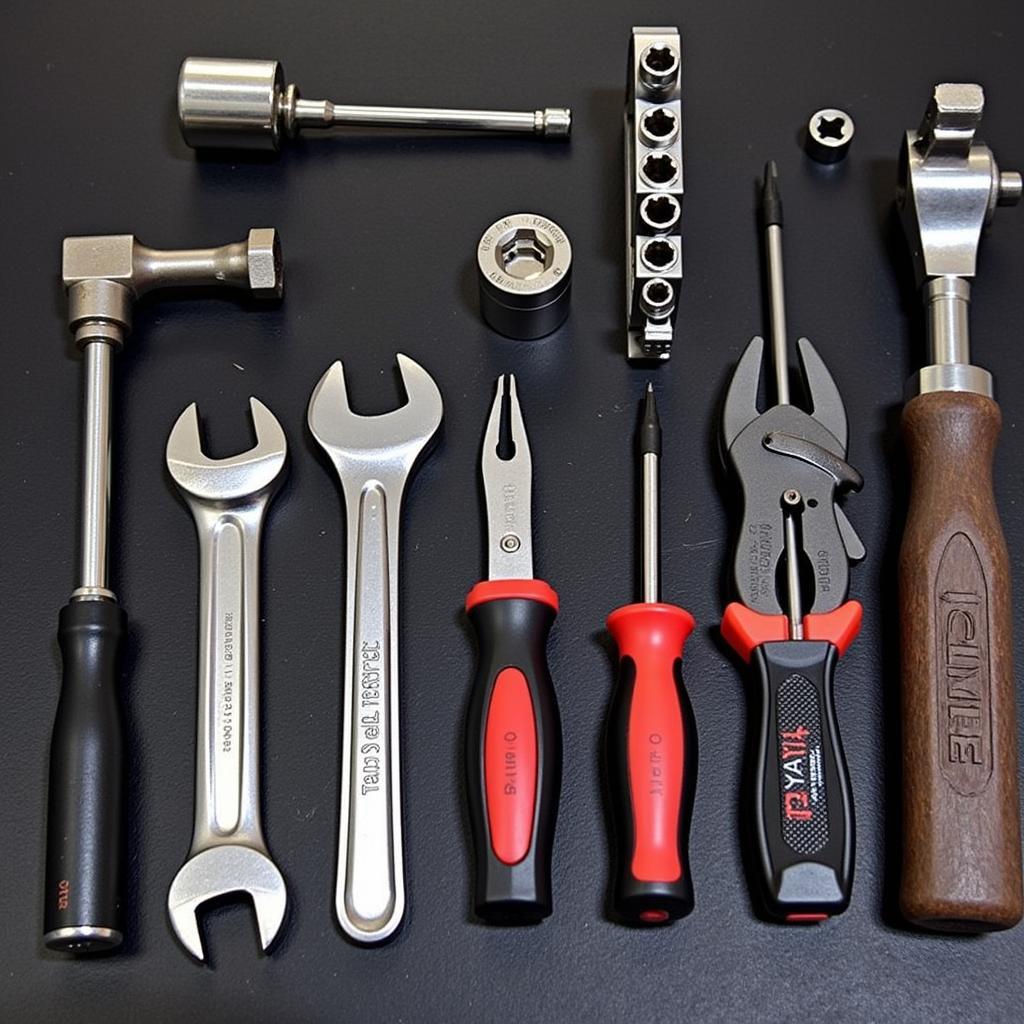Car service relies heavily on specialized Tools Used For Car Service. From simple hand tools to complex diagnostic equipment, having the right tools is crucial for efficient and accurate car maintenance and repair. This article will explore the essential tools used for car service, covering everything from basic hand tools to advanced diagnostic equipment. Whether you’re a professional mechanic or a DIY enthusiast, understanding these tools will help you perform car service effectively.
Hand Tools: The Foundation of Car Service
Every car service task, big or small, begins with a set of reliable hand tools. These are the workhorses of any garage, essential for tasks ranging from changing a tire to performing complex engine repairs.
- Wrenches: A variety of wrenches, including combination wrenches, open-end wrenches, and socket wrenches, are essential for loosening and tightening nuts and bolts. Having a complete set in both metric and standard sizes is crucial.
- Screwdrivers: Like wrenches, screwdrivers come in various types and sizes. Phillips head, flathead, and Torx screwdrivers are commonly used for removing and installing screws.
- Pliers: Pliers are versatile tools used for gripping, cutting, and bending. Needle-nose pliers, slip-joint pliers, and locking pliers are essential for various car service tasks.
- Hammers: While not as frequently used as other hand tools, hammers are necessary for tasks like removing stuck parts or driving in fasteners.
- Sockets and Ratchets: Socket wrenches provide greater leverage and speed than traditional wrenches, making them ideal for removing and tightening nuts and bolts in tight spaces.
 Essential Hand Tools for Car Service
Essential Hand Tools for Car Service
Diagnostic Tools: Unveiling the Secrets of Your Car
Modern cars are complex machines controlled by sophisticated computer systems. Diagnostic tools are essential for understanding the inner workings of these systems and identifying potential problems.
- OBD-II Scanners: These devices connect to the car’s onboard diagnostic port and retrieve diagnostic trouble codes (DTCs) that pinpoint specific issues. From basic code readers to advanced scan tools, OBD-II scanners are indispensable for modern car service.
- Multimeters: Multimeters measure voltage, current, and resistance, allowing mechanics to diagnose electrical problems in the car’s various systems.
- Pressure Gauges: These tools measure pressure in different systems, including tire pressure, fuel pressure, and oil pressure.
- Vacuum Gauges: Vacuum gauges are used to diagnose issues in the engine’s intake system and can reveal problems like vacuum leaks or a faulty intake manifold gasket.
Specialized Tools: Tackling Specific Car Service Tasks
Beyond hand tools and diagnostic equipment, various specialized tools are designed for specific car service tasks.
- Tire Changers: These machines simplify the process of removing and installing tires, making tire changes quicker and more efficient.
- Wheel Balancers: Wheel balancers ensure that tires are properly balanced, preventing vibrations and uneven tire wear.
- Brake Bleeders: Brake bleeders are used to remove air from the brake lines, ensuring proper brake function.
- Battery Testers and Chargers: These tools are essential for testing the health of a car battery and charging it if necessary.
What tools are necessary for servicing a car? The specific tools needed depend on the service being performed, but a basic set of hand tools, diagnostic equipment, and specialized tools are essential for comprehensive car service.
Expert Insights: The Importance of the Right Tools
“Having the right tools for car service is like having the right ingredients for a recipe,” says David Miller, a seasoned automotive technician with over 20 years of experience. “You can’t create a masterpiece without the proper tools, and the same applies to car service. Using the correct tools ensures efficient repairs and prevents further damage.”
“Investing in quality tools is a wise decision,” adds Sarah Johnson, an automotive engineer. “Quality tools are more durable, reliable, and accurate, leading to better results and fewer headaches in the long run.”
Conclusion: Equipping Yourself for Success in Car Service
Tools used for car service are essential for maintaining and repairing vehicles effectively. From basic hand tools to advanced diagnostic equipment, each tool plays a vital role in ensuring efficient and accurate car service. Whether you’re a professional mechanic or a DIYer, having the right tools will empower you to tackle any car service task with confidence.
FAQ: Frequently Asked Questions About Car Service Tools
- What is the most important tool for car service?
An OBD-II scanner is arguably the most important tool for modern car service. - What basic hand tools do I need for car service?
A basic set should include wrenches, screwdrivers, pliers, a hammer, and a socket set. - Do I need specialized tools for car service?
Specialized tools are needed for specific tasks like tire changes or brake bleeding. - How do I choose the right diagnostic tool?
Consider the features, capabilities, and price range when choosing a diagnostic tool. - Where can I buy car service tools?
Car service tools can be purchased from automotive parts stores, online retailers, and tool suppliers. - What are the benefits of using quality car service tools?
Quality tools are more durable, reliable, and accurate. - How do I maintain my car service tools?
Keep your tools clean, organized, and stored properly to ensure their longevity.
Need help with car diagnostics? Contact us via WhatsApp: +1(641)206-8880, Email: [email protected] or visit us at 910 Cedar Lane, Chicago, IL 60605, USA. We offer 24/7 customer support. We also have other articles on our website related to car maintenance and specific repair procedures. Check them out for more helpful tips and guidance.

Leave a Reply